5. THE YOUNG REPUBLIC

JEFFERSON AND THE REPUBLICANS
| CONTENTS
 Jefferson begins the reign of the Jefferson begins the reign of the
Democratic-Republicans
 The war with the Barbary pirates at "the The war with the Barbary pirates at "the
shores of Tripoli"
 The Louisiana Purchase ... and the The Louisiana Purchase ... and the
follow-up expeditions
 Hamilton vs. Burr Hamilton vs. Burr
 Marshall develops considerably the Marshall develops considerably the
powers of the Supreme Court
 America is introduced to the Industrial America is introduced to the Industrial
Revolution
The textual material on this webpage is drawn directly from my work
America – The Covenant Nation © 2021, Volume One, pages 191-199.
|
|
A Timeline of Major Events during this period
| 1800s |
1802-1810 Jefferson’s Treasury Secretary Albert Gallatin reverses Hamilton's policies, cutting federal expenditures in half
(importantly the army and navy) and reducing the federal debt, but proposing massive road and canal building to open the interior to settlement, favoring Republican farmers of the American South and West and undercutting Federalist bankers and merchants of New England
1803 Marshall’s Supreme Court in Marbury v. Madison (questioning the "midnight" judicial appointments) assumes the power of
"constitutional review" of Congress's legislation
Jefferson's envoys to Napoleon
secure the Louisiana Purchase for $15 (actually $11.2) million (acquiring land for settlers
who will most likely be supporters of Jefferson’s Republican Party!)
1804 The 12th Amendment eliminates the confusion caused by the 1800 presidential election
Jefferson orders the (small) navy to
end the piracy of the Barbary States (the Libyan coast)
Following a long-simmering political feud, Burr kills Hamilton in a duel
1804-1806 Lewis and Clark lead a party exploring (to the Pacific) the newly purchased Louisiana
territory
1806 Pike leads a military party to further explore parts of the American West (today's Colorado)
|
JEFFERSON BEGINS THE REIGN OF THE
DEMOCRATIC-REPUBLICANS (OR JUST "REPUBLICANS") |
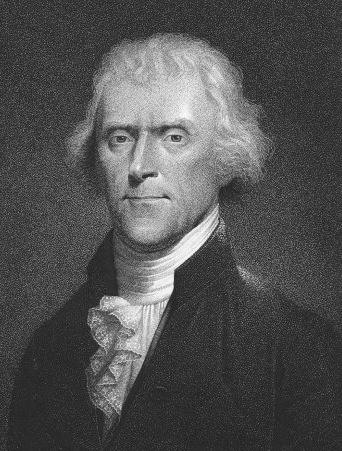
Thomas Jefferson – 3rd President of the United
States
|
Jefferson "changes" the character of federal government
With
Jefferson's election to the presidency in late 1800, there would be a
dramatic shift in the character of the new Republic. The Federalists
were out; the Republicans were in. The Federalist emphasis under
Washington (inspired by his close advisor Hamilton) had been to serve
primarily the urban, commercial interests of the coastal East. The
Republican emphasis under Jefferson (and the fellow Virginians who
followed him to the presidency) would be the rural South and West.
Reshaping the Republic's finances
Hamilton
had used a growing (but responsible) national debt as a means of
locking the financial leaders of the new country into full support of
the new Republic. However, inspired by the American farmer's
instinctive dislike of the banking world, Jefferson moved immediately
to undercut Hamilton's strategy by reducing the size of the debt. He
had his new treasury secretary, Albert Gallatin, abolish domestic
taxation (such as the hated excise tax on the farmers' whiskey) and
instead raise revenue through enhanced customs duties ... and the sale
of land in the Western territories. The former measure would put most
of the new tax burden on the commercial Northeast. The latter measure,
through actually rather inexpensive land sales, would bring about
greater American settlement in the Western territories, putting further
burden on the Indian tribes living there. Jefferson's intention was
clearly to strengthen the political voice in the new Republic of the
rural South and West at the cost of the heavily urban Federalist
Northeast.
Also in line with his Republican dislike of a
strong central authority (preferring "states'-rights" instead) and as
part of his strategy to reduce the Republic's debts, Jefferson moved to
reduce the government budget by half, and thus also to reduce the
federal bureaucracy by nearly the same amount. A particular target was
the collectors of the excise (mostly whiskey) tax. Also, as the
bureaucracy had been previously staffed almost entirely through
Federalist appointments, Jefferson's Republicans were placed
immediately in half of the remaining positions.
|
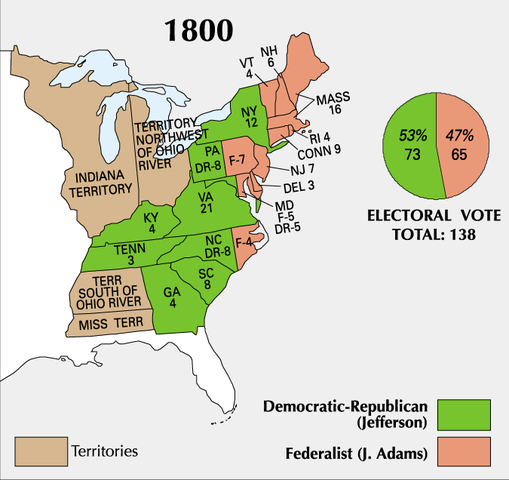 Presidential election of
1800 – electoral votes
Presidential election of
1800 – electoral votes
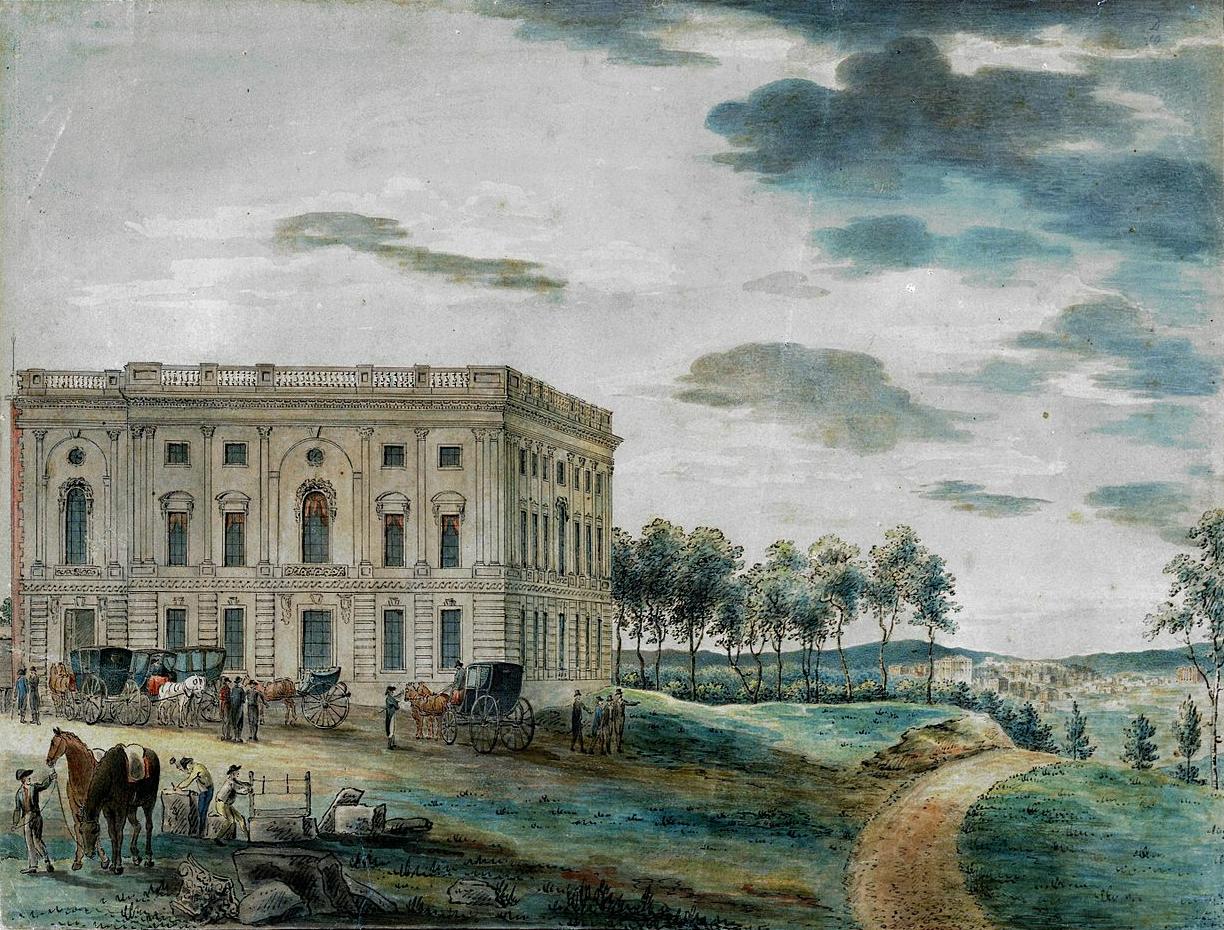
The Capitol when first occupied
by Congress – 1800 – by William Russell Birch
Library of Congressa name="Tripoli">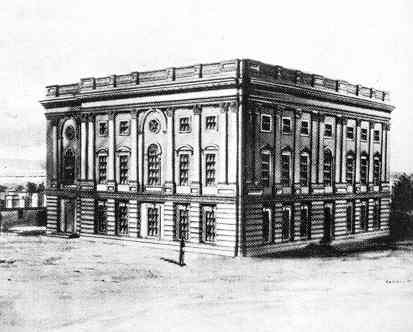
U.S. Capitol building – ca.
1800
Library of
Congress
THE
WAR WITH THE BARBARY PIRATES AT "THE SHORES OF TRIPOLI" |
| Jefferson
was also adamantly opposed to maintaining at the public expense a huge
standing army. Using the logic that the Indian tribes to the West had
been pacified, Jefferson was eventually able to cut the size of the
army in half.1 He also had a similar goal with respect to the navy,
wanting to replace the navy's six new fighting ships (frigates) with
smaller coastal vessels, used primarily to catch Northeastern shippers
trying to avoid Jefferson's new customs duties.
However, before he got going on his naval
reduction program, he found himself facing a huge problem that had long
infuriated the Americans: the Barbary pirates of the North African
Mediterranean coast. Operating as privateers out of the Muslim states
of Tripoli, Tunisia, Algiers and Morocco, these pirates had long raided
Christian shipping, seizing not just the ships and their cargo but also
the sailors who manned them, holding them for ransom or even selling
them into slavery. America paid a huge ransom each year to bring
release for its captured sailors: approximately one million dollars
annually, roughly ten percent of the government's total budget.
Jefferson had long protested the decision of
Washington and Adams to pay this ransom, and now, as president, was
determined that this policy was going to come to an end. When the
Bashaw of Tripoli declared war on the United States in 1801, Jefferson
responded by sending Commodore Preble, who linked up with the King of
Naples (Italy) to attack Tripoli's pirates. Then Preble set up a
blockade against the Barbary states with an increase in the American
naval presence in the Mediterranean. But in late 1803 one of his
frigates (the Philadelphia) ran aground in the Tripoli harbor. However,
rather than let the ship fall into the hands of the pirates, in early
1804 Americans boldly slipped into the harbor and set the ship ablaze.
Then in 1805 the American consul in Tunis gathered a band of
mercenaries and crossed the Libyan desert to seize the coastal town of
Derna, just as also the American fleet arrived to bombard the town from
the sea. The Barbary pirates were ready to sue for peace. And thus the
Americans proved themselves quite ably on the high seas.
But growing problems with England and France as
the Napoleonic Wars heated back up again would pull the Navy from the
region in 1807. It would not be until after those wars were brought to
an end in 1815 that a final victory over the Barbary states would be
accomplished.
1However,
he did perform one great service to the military by establishing a
military academy at West Point, the goal being to bring young
Republicans into military command.
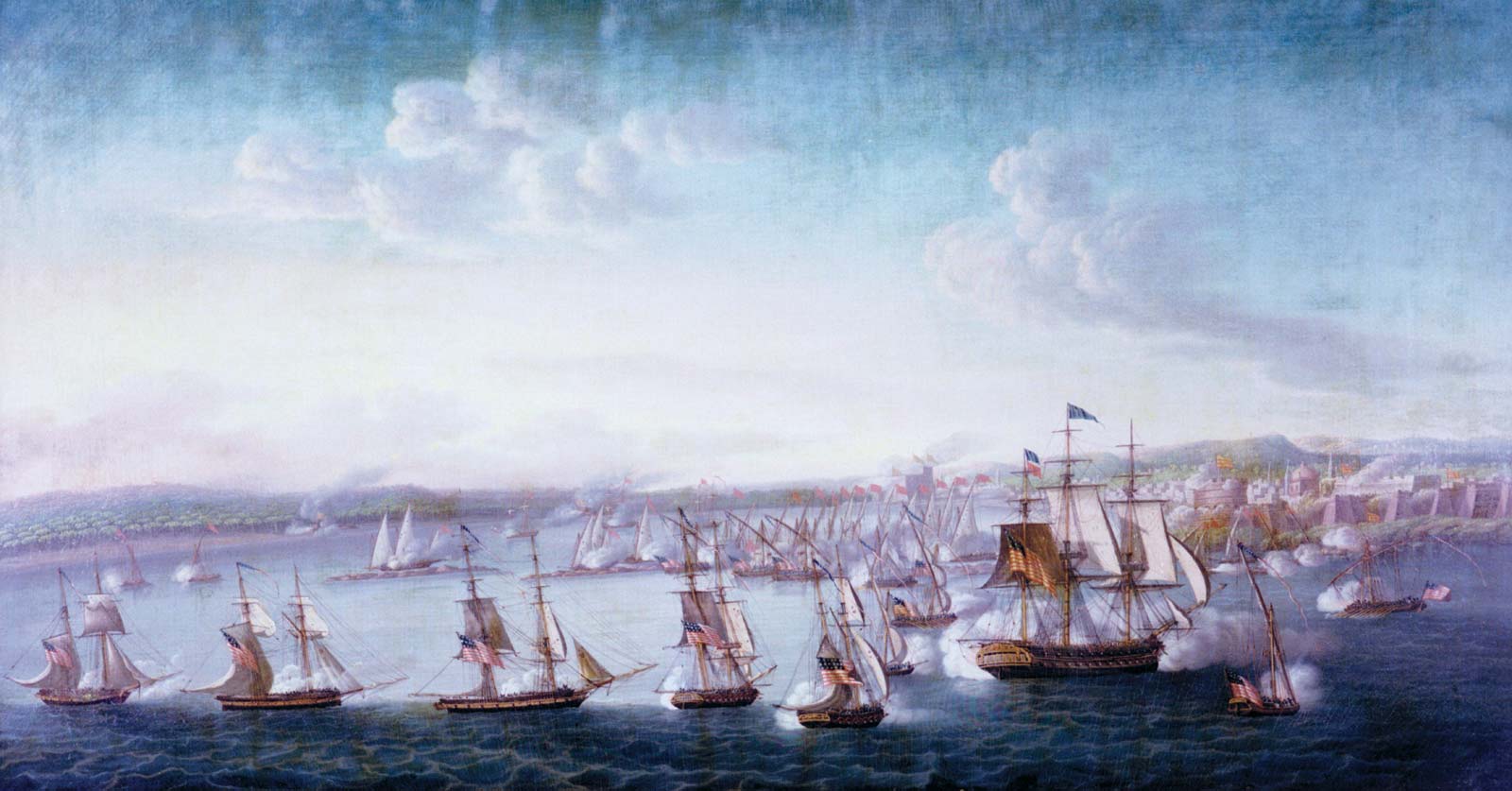 The bombardment of the harbor at Tripoli (August 3, 1805)
U.S. Naval Academy Museum, Annapolis
THE
LOUSIANA PURCHASE (1803) ... AND THE FOLLOW-UP EXPEDITIONS |
|
The Louisiana Purchase (1803)
At the same time that he was
reducing the influence in the Republic of the urban (and Federalist)
Northeast, Jefferson busied himself looking to the territory across to
the West of the Appalachian Mountains. The new American Northwest
beckoned thousands of agrarian (and thus Republican) settlers. As
nature would have things however, to bring their produce to market
these settlers would have to look to the rivers which flowed west and
south away from the mountains and toward the mighty Mississippi River,
which however flowed through French territory as it approached, via the
town of New Orleans, the Gulf of Mexico and thus the high seas.
So it was that Jefferson asked his ambassador to
France, Robert Livingston (who was later joined by future president
James Monroe) to negotiate with Napoleon the purchase of this French
town, for $10 million. But America was in for a surprise when Napoleon
offered not just New Orleans, but the entire French territory
(Louisiana) to the west of the Mississippi River to America – for a
mere $15 million dollars.
The Louisiana Territory (which reached westward
all the way to the Rocky Mountains) had been originally French but was
turned over to the Spanish in 1763 as the price of France's losing the
French and Indian War (Europe's Seven Years' War). But in 1800 the
French Emperor Napoleon forced Spain to give it back to France in
anticipation of renewing the French Empire in America. But failure in
1802 to suppress a Creole (African) independence uprising in the
sugar-rich Caribbean island of Saint-Dominique (Haiti) and a renewal of
hostilities with England had left Napoleon desperately in need of cash.
This is what moved Napoleon therefore to sell off the whole Louisiana
Territory to the new United States. In any case, Napoleon saw no
immediate economic advantage in possessing this vast continental
wilderness, and fifteen million dollars seemed much more useful to his
European ambitions. And thanks to Hamilton's having put the young
American Republic on strong financial footing, America was well able to
afford the Europe-recognized rights to this very valuable Western
territory.2
In effect this nearly doubled the size of the new
American nation. And it ended (for a while anyway) French ambitions in
America, and put America on a new international footing. As Robert
Livingston himself put things at the time of the signing:
We have lived long but this is the noblest work
of our whole lives. The United States take rank this day among the
first powers of the world.
2The Indians, of
course, would offer no such recognition. But that legal matter counted
for little in the American thinking at the time.
3Notice that the
"United States" is used in the plural! The Union is still seen at this
times basically as an alliance of numerous independent states rather
than as a single political entity.
|
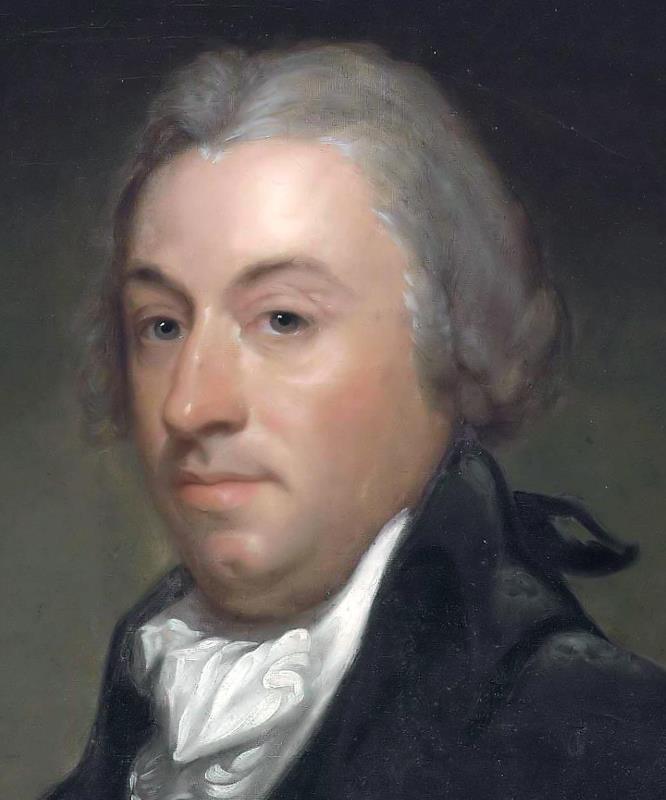
Robert Livingston
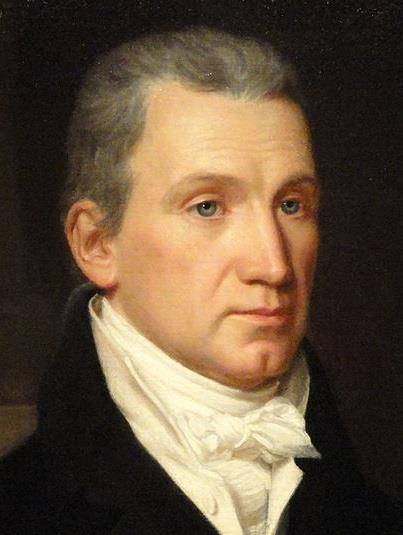
James Monroe
|
The Lewis and Clark Expedition (1804-1806)
Jefferson was quick
to send army Captain Meriwether Lewis (accompanied by William Clark)
and a team of fifty men to explore this new territory. Leaving St.
Louis in May of 1804, they headed west up the Missouri River, hoping to
find finally a water route to connect with the Pacific Ocean, reaching
today's North Dakota as winter set in. Here they hired a French fur
trapper and his Indian wife (Sacajawea) to guide them further west. The
next summer they reached the headwaters of the Missouri River in the
high Rocky Mountains, disappointed in not finding the water route they
had hoped for. Then they pushed westward beyond the Rockies (and thus
the boundaries of the Louisiana Territory) until, after an incredibly
difficult time, they reached the Pacific Ocean in November. There they
wintered, turned back eastward in early 1806, and arrived in St. Louis
in September – welcomed with great enthusiasm as heroes.4
Federal land development
In looking West,
Jefferson saw the need to connect that part of America with the home
base east of the Appalachian Mountains. Western land sales were booming
and the U.S. Treasury thus was well endowed to finance public roads and
canals. A Republican Congress in 1806 authorized Jefferson to construct
a national road reaching into the Ohio territory. But this was just the
beginning. Treasury Secretary Albert Gallatin began work on a proposal
for massive development of America's agricultural hinterland, to help
the farmer get his goods to market by road or by canal. In 1808 he
proposed a multi-million-dollar (sixteen to twenty million) plan to
build a canal to connect the Atlantic (via the Hudson River) with the
Great Lakes and to construct additional national roads, some of the
plan financed directly by the national government, some of it through
private contractors financed by loans from the government.5
Thus it was that the small-government mentality of
the Republicans was easily reversed when it came to the role of the
government in supporting the American farmer!
4Jefferson
would also send out other teams to explore the new territory, including
that of Gen. Zebulon Pike who in 1806 ventured as far west as the
territory that would become Colorado (who also was captured by the
Spanish in the process, but released in 1807!).
5In the end, most of this project was financed by private interests or the States rather than by the federal government.

Meriwether Lewis

William Clark
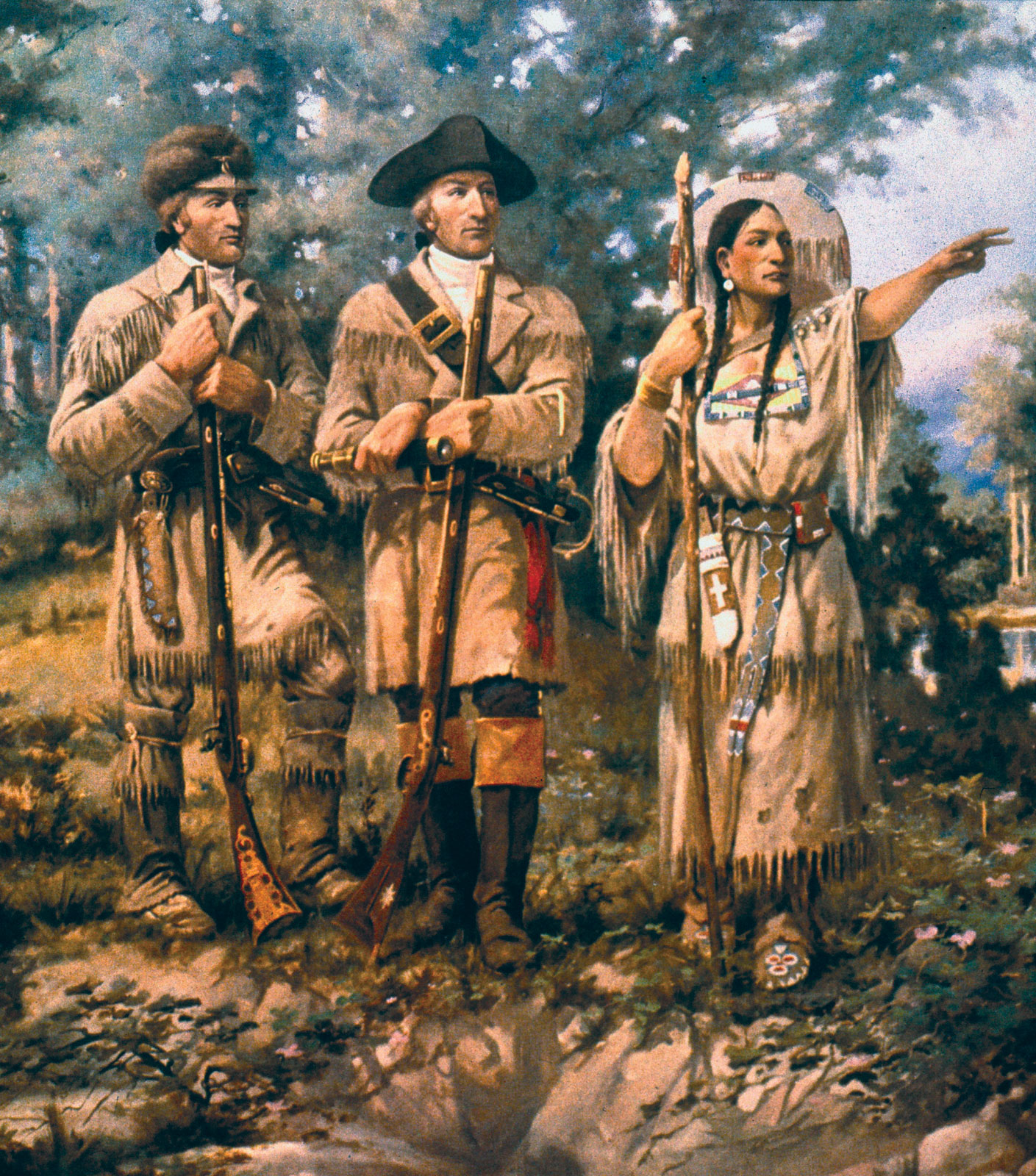 Lewis, Clark and Sacagawea Lewis, Clark and Sacagawea
Montana House of Representatives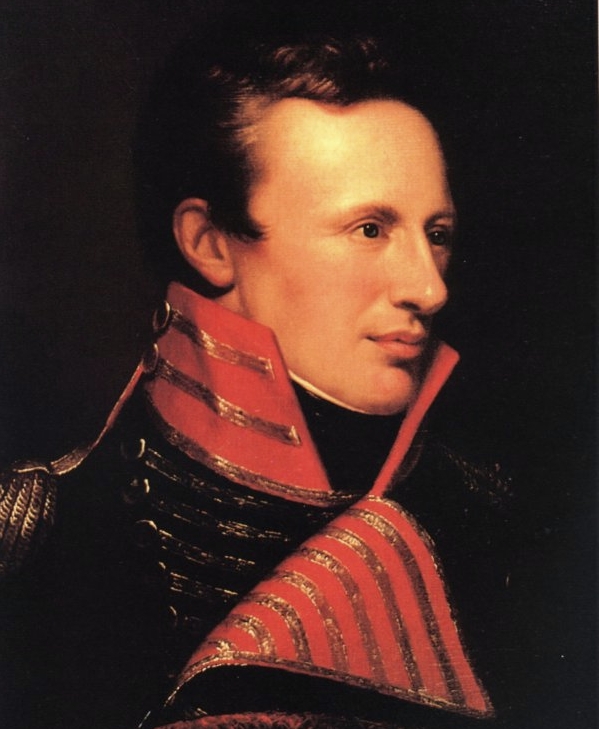 Zebulon Pike
Zebulon Pike
led two additional explorations into the American West (1805-1806 and 1806-1807)
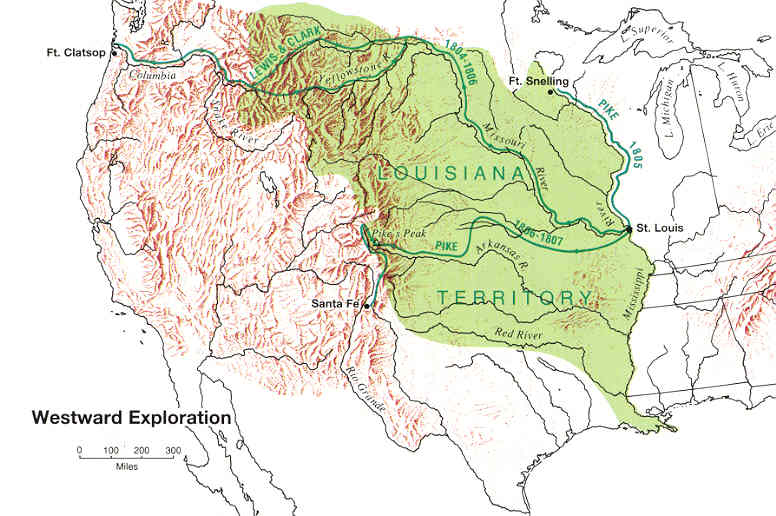 The explorations of the New
Louisiana Territory by Lewis and Clark and by Pike -
1804-1807
The explorations of the New
Louisiana Territory by Lewis and Clark and by Pike -
1804-1807
| Aaron
Burr was an ambitious American "who would be king." He headed up the
New York wing of Jefferson's Republican Party, and was selected to run
with Jefferson in 1800 to balance the ticket (Virginia South and New
York North). But at the time, the vote was not set up in a way that
could distinguish a presidential vote from a vice-presidential vote and
Burr had the same number of votes as Jefferson.6
Hamilton took this opportunity to harass his old
political opponent Jefferson by urging the Federalists to tie up the
vote when it went to the House of Representatives (to break the tie
between the two candidates). Yet in the end Hamilton disliked even more
intensely Burr and finally threw his support to Jefferson, not gaining
any appreciation from Jefferson however, but gaining a deep hatred from
the extremely ambitious Burr.
The rivalry finally reached crisis proportions
four years later in the heat of a New York governorship election in
which Burr was a candidate (he had been dropped by Jefferson as his
running mate in Jefferson's reelection bid that year). Deeply
derogatory anti-Burr letters that Hamilton had written, intended for
private usage only, ended up being submitted for publication (no one is
quite certain by whom), producing the sense of deep insult that back
then demanded remedy in the usual way: a pistol duel. This was quite
illegal, but widely practiced at the time. Most of these duels ended up
with both parties purposely shooting wild, not hurting anyone, but
satisfying the code of honor. Hamilton had participated in ten of these
prior to his meeting with Burr on July 11, 1804, though his son Philip
had been killed a few years earlier in a duel when the shot-less
strategy went awry.
Anyway, Hamilton shot first, a bit wide of the
mark (accidentally or purposely?). Burr returned the shot, mortally
wounding Hamilton, who died the next day from the wound.
Burr was subsequently indicted for murder,
although the charges were soon dropped. But sensing that he had just
killed not only his enemy Hamilton but also his own political career,
Burr retreated to South Carolina. Then he returned to Washington, D.C.
to finish out his last months as Vice President, before heading West to
the recently acquired Louisiana Territory to start a new life (of
political intrigue?). He had plans of a strange sort which were later
reported by (an even bigger schemer) Wilkinson as involving the
creation of an empire with Burr as its head (never really proved – nor
disproved). Burr then moved to Europe, finally returning in 1812 to his
law practice in New York, spending the rest of his life quietly out of
politics!
6This error would be corrected by the 12th Amendment to the Constitution, fully ratified by the States in 1804.
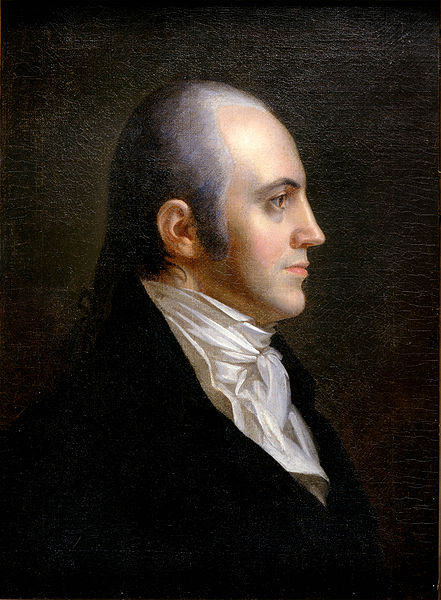 Aaron Burr
Aaron Burr
Killed Hamilton at a duel on July 11, 1804
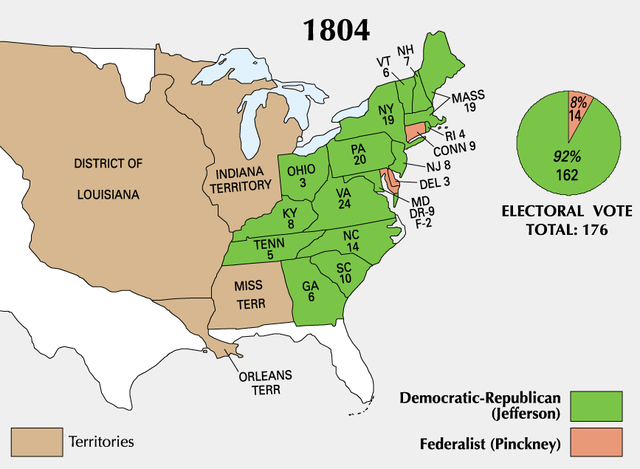 Presidential election of
1804 – electoral votes
Presidential election of
1804 – electoral votes
The elections nearly wipe out the Federalists as a political body
MARSHALL DEVELOPS CONSIDERABLY THE POWERS OF THE SUPREME
COURT |
|
Marshall develops of the powers of the U.S. Supreme Court
One
part of the Federalist heritage that the Republicans could not undo was
the Supreme Court and its various Federalist appointees by Adams, most
notably the U.S. Supreme Court Chief Justice John Marshall. Marshall
was a strong Federalist, unlike most of the rest of his fellow
Virginians, who tended to be Jeffersonian Republicans. He had declined
Washington's offers of being a part of his Administration (turning down
the offer first to be the nation's attorney general and then ambassador
to France) and even Adams' first attempt to nominate him to the Supreme
Court. But considered one of the most brilliant lawyers of his days, he
was again nominated to the Supreme Court as its chief justice in Adam's
frantic effort to put Federalists in office before the Republicans took
control of both houses of Congress and the White House in early 1801.
This time Marshall accepted the offer.
Jefferson and the Republicans were furious about
the Federalist judiciary, especially by the way the
Federalist-dominated courts had treated Republicans under the ill-fated
Alien and Sedition Acts, and were determined to clean the courts of the
midnight judges. Jefferson's secretary of state, Madison, refused to
sign the commission of the Federalist William Marbury, a commission
appointing Marbury as justice of the peace in Washington D.C. Marbury
sued Madison, bringing before Marshall's Supreme Court the famous case
of Marbury v. Madison (1803).
But ultimately Marbury lost the case, due to
Marshall's questioning about who exactly had the right to bring this
case before the Supreme Court. In theory Marbury had a right to his
appointment. But it was done under a law, the Judiciary Act of 1789,
that supposedly gave Marbury that right to bring the case directly to
the Supreme Court. But Marshall argued that the Constitution itself
permits original jurisdiction for the Supreme Court only to foreign
policy issues or state issues. Marbury's case involved neither factor,
despite what the 1789 law seemed to authorize. In fact, the 1789 law of
Congress was invalid, because it was "unconstitutional." Thus Marbury
had no right under the Constitution to proceed as he had.
In one short stroke, Marshall had just accorded to
the Supreme Court the power to decide what laws of Congress were and
were not constitutional. Though the Constitution itself mentioned no
such power belonging to the Supreme Court, Marshall's decision was not
contested. At the time, it seemed like a win to the Republicans. But
the Republicans did not see that the principle underlying Marshall's
decision laid the groundwork for the Supreme Court to continue to move
down this road of making itself the ultimate decider in the land as to
what was law and what was not, or worse, how the law might be better
interpreted by progressive judges.
For the next three decades Marshall and the
Supreme Court rendered various decisions which further strengthened not
only the voice of the Supreme Court, but also the supremacy of the
Washington, D.C., government over the various state governments. For
instance, in the Fletcher v. Peck (1810) decision, Marshall's
Supreme Court affirmed that federal authority took precedence over the
laws of the individual states. In McCulloch v. Maryland (1819), his court denied the rights of the states to tax federal agencies (in this case the Bank of the U.S.). In Cohens v. Virginia (1821) Marshall declared that the Supreme Court had review powers over the decisions of the state courts.
The larger implications of Marshall's legal inventiveness
In his 34 years of Supreme Court service (1801-1835), he turned this
panel of judges into something more akin to true legislators, revising
the law of the land at will. Not only did his court pass judgment
on legal contests that inevitably arise from applying the law in
particular cases (the traditional role of English judges) ... he
actually went well beyond that in deciding how such laws should be
interpreted or even be reinterpreted ... or even be set aside as
"unconstitutional" – according to his own personal Federalist political
instincts. But these could be almost anything he deemed as
"reasonable." Thus slowly he was reshaping Constitutional Law so
as to make it conform to the logic or reason of a small group of
jurists who happened to be sitting on the bench – actually only a
simple majority among them being required for a wide-sweeping decision.
And there was no built-in "check" on such enormous power.
Justices, once appointed, served for life – not subject to any
subsequent elections or renewals of their appointments by the world
other than their deaths (or voluntary retirement) itself. Tragically,
the Framers of the Constitution did not see this power-expansion coming.
No such power as the Supreme Court assumed for itself was actually
ever assigned by the Constitution. And the English political tradition
that the Framers thought they were working with had no such grants of
political power assigned to their judges. This political expansion was
all a result of Marshall's personal creativity.
Wow! Lawyers in black robes! But what else did anyone think was
likely to occur if nothing was said or noticed at the time.
In any case, this single judicial appointment would establish a
political path that would slowly make the Supreme Court, not Congress,
the supreme legislative body of the land
|
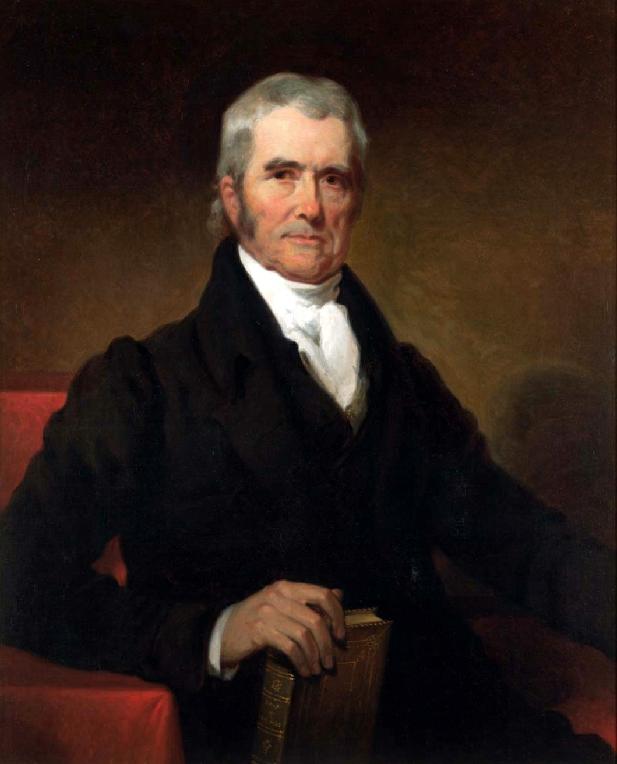
John Marshall – by Henry Inman,
1832
Library of Virginia,
Richmond
AMERICA IS INTRODUCED
TO THE INDUSTRIAL
REVOLUTION |
| Beyond
mere self-support, the American economy since its founding as a group
of English colonies was designed from the point of view of the English
mother country largely with one purpose in mind: to supply England with
raw materials needed to feed its growing industrial society. New
England, however, tended to pursue an economic agenda arising from a
strong instinct for full economic self-support (food, housing, personal
items), with its Puritan ideal of Christian self-sufficiency. However,
the American South from its founding had been deeply supportive of the
mother country's hunger for raw materials: tobacco, dyes, and – at
first – small amounts of cotton.7 But by the end of the 1700s all of that was about to change.
The beginnings of America's Industrial Revolution
Samuel Slater was an Englishman who had apprenticed as a youth to
Richard Arkwright, the inventor of the water-driven machinery which
spun raw cotton into the thread needed for England's growing textile
industry. Slater slipped off to America in 1789 with the knowledge of
this process in his head (such technology was considered such a
strategic secret that what Slater was doing was highly illegal in
England), to set up a spinning mill of his own in Rhode Island in 1790.
So successful was his mill that Slater soon expanded his operations to
Massachusetts, Connecticut, and New Hampshire.
Slater's contribution to the American economy
coincided with the contribution that Eli Whitney made, when as a youth
he moved from Massachusetts to Georgia to study law. Observing the
painfully slow process by which slaves extracted seeds from cotton
balls in order to ready the cotton as raw material for yarn production,
in 1793 Whitney came up with a machine that could perform that same
process mechanically, greatly speeding up the process – and the
profitability of Southern cotton production destined for the English
textile mills (and soon the rapidly growing number of Yankee textile
mills in New England).
Indeed, this simple invention revolutionized the
South, confirming the South as an agrarian society focused on the
growing and exporting of raw cotton, but also confirming slavery as a
Southern institution, as thousands of slaves would be needed to plant
and pick the cotton now so vital to the Southern economy (and to the
small Southern aristocracy whose wealth soon became founded almost
entirely on this single industry).
Growing sectionalism
What was taking place
was the widening of the gap that separated the Northern or Yankee
culture from the Southern slave-based aristocratic culture. Yankee
culture extolled hard work and inventiveness, and produced not only an
ever-widening variety of industrial products but also a rapid growth in
inventions that would quickly bring America into the industrial
revolution that had been shaking Europe. In fact, very soon, Yankee
America would surpass Europe itself in the vastness of its industrial
creativity and energy.
It was heady stuff, stimulating a culture that
became increasingly fascinated with its own human ability or powers to
shape the world according to its own design. It did not at first see
itself as leaving behind the deeply devout Christian culture that had
originally formed New England. It was simply moving ahead or
progressing (supposedly to the pleasure of the Creator-God) in bringing
the wonders of a perfect heaven to an ever-perfecting earth.
The South, on the other hand, seemed to be moving
in the direction of Jefferson's idealized agrarian utopia, where a
leisured gentry would preside over a highly structured, even rigidly
stratified, agricultural society. Supposedly this presented a picture
of agrarian bliss, with the slaves singing in the fields as they
produced the harvests that brought the valuable revenues to the entire
community, and the aristocracy conducting their rounds of intellectual
discourse and genteel socializing as the confirming symbol of the
success of it all. Of course few people lived lives that measured up to
this bliss. But it was a beautiful social picture, so compelling that
it led even poor White farmers to believe that someday they would share
this same bliss with their cousins enjoying the refinements of
plantation life.
In many ways this was the cause of the bitterness
that separated Jefferson and his Republicans from Hamilton and the
Federalists. Hamilton came of questionable social circumstances and had
worked his way forward in society through simply a lot of hard work and
sheer determination. To Jefferson, born to social privilege, Hamilton's
type of social climbing seemed vulgar (as it did also to all English
gentry) and inappropriate as a social model for the emerging American
culture.
Indeed, these two life-styles, these two cultures,
not only had little in common except the name American, they were in so
many ways mutually antagonistic that there was no way that some kind of
cultural, social or even political battle was not inevitable.
And Hamilton's death at the hands of the aristocratic Burr (who, though
a New York northerner, shared Jefferson's view on how America should
take shape) was perhaps symbolic of the bitter struggle to come.
Southern honor, after all, simply could not be allowed to suffer the
indignities of upstart Yankee presumptuousness.
7In
comparison to the Caribbean Islands, which supplied to England the
commodities of sugar and rum – highly sought after at that time – the
English colonies of continental America were considered to be
interesting, but of much lesser value as economic assets.
|
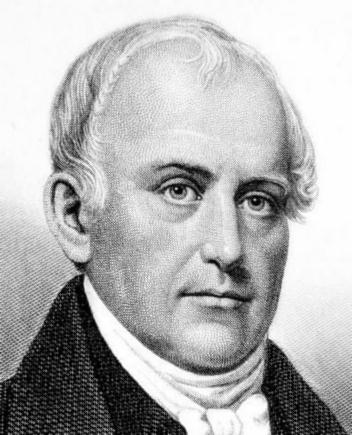
Samuel Slater
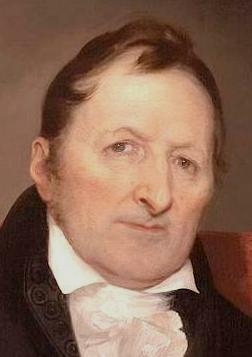
Eli Whitney
Through their mechanical organization or inventions, Slater built up American
textile manufacture and Whitney built up American cotton production.
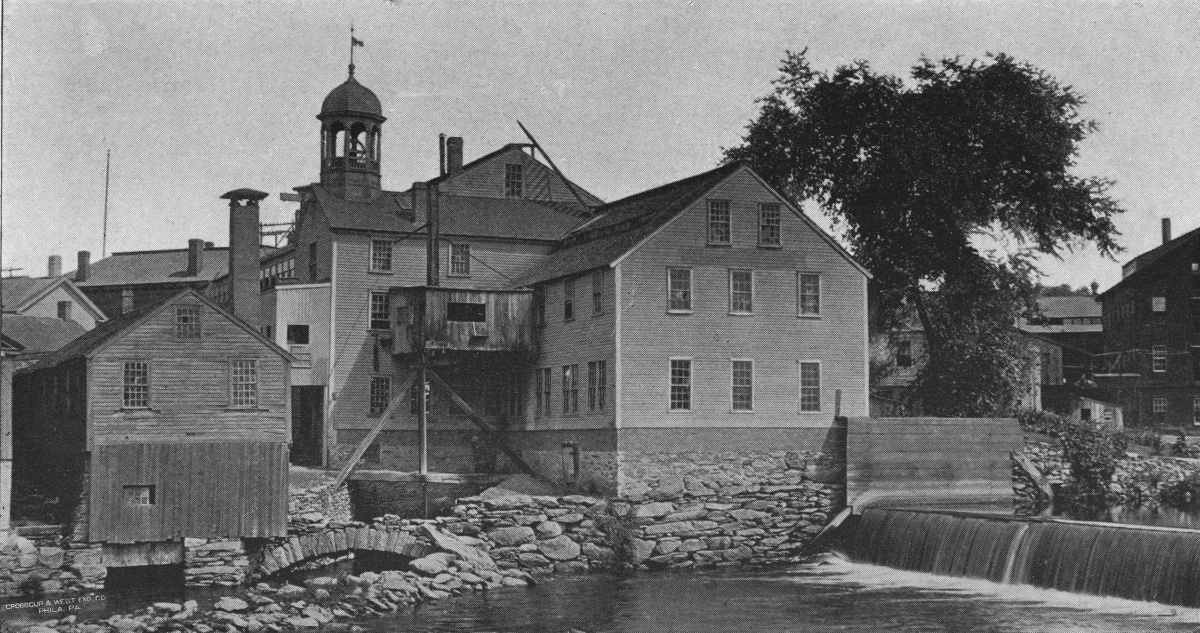
The Old Slater Mill, Pawtucket, Rhode Island (first built in 1793)
The first cotton-spinning mill successfully operated in America
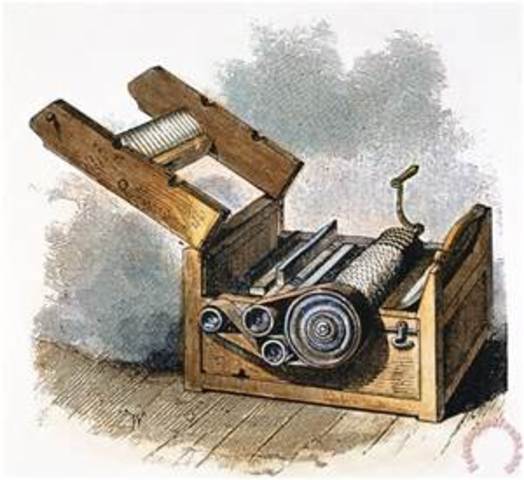
Whitney's 1793 cotton gin – much faster way of removing seeds from raw cotton
revolutionizing the South's cotton farming industry (and the slavery to support it)
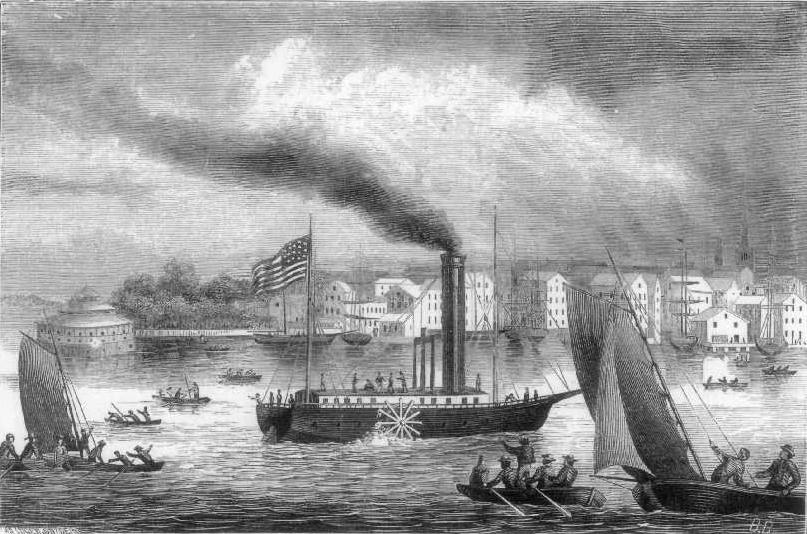
Robert Fulton's paddle-wheel steamboat (August 1807)
making its way up the Hudson River from New York City to Albany in 32 hours of travel time
 Miles
H. Hodges Miles
H. Hodges
| | | | |


 Presidential election of
1800 – electoral votes
Presidential election of
1800 – electoral votes
















 Presidential election of
1804 – electoral votes
Presidential election of
1804 – electoral votes






